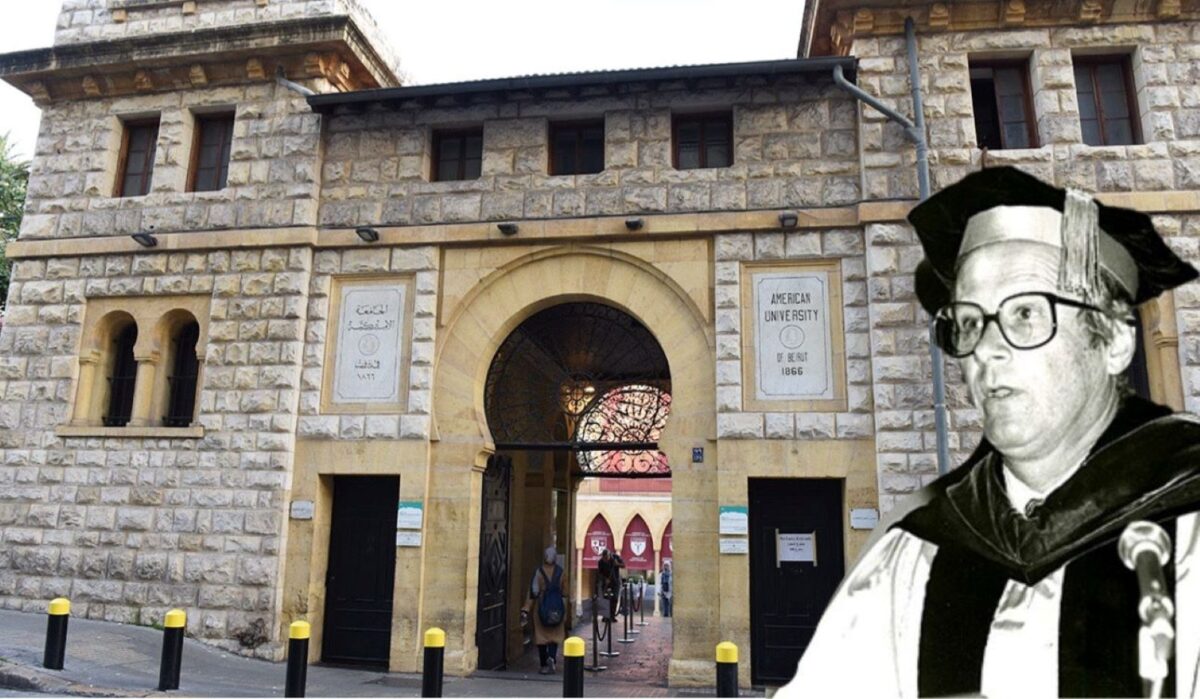
Last week, the American University of Beirut (AUB) marked the 50th anniversary of the Lebanese Civil War with a series of public events. These weren’t just commemorations—they were acts of resistance against the ruling class’s ongoing campaign of enforced amnesia. For decades, those in power have tried to bury the memory of a war that left over 120,000 dead and hundreds of thousands wounded, displaced, or disappeared. AUB chose remembrance over silence.
By chance, “Civil War Week” coincided with “Palestine Week”—a faculty-student-organized tradition usually held in early March. To avoid overlap, the organizing committees, in coordination with the university administration, reached a respectful, transparent compromise. The goal was simple: protect the academic atmosphere and honor both events without politicized friction.
But this good-faith effort was met with a backlash from the usual suspects. Hezbollah and its ideological echo chamber—the so-called Axis of Resistance and its cultural sidekick, the Axis of Shallowness—saw in this an opportunity to stir chaos. Their outrage had little to do with Palestine and everything to do with control. Once again, they cloaked authoritarian instincts in faux-secular outrage.
Soon, the smear machine kicked into gear. Some accused the university—and me personally—of betraying the Palestinian cause, of serving a “Zionist-American agenda,” all because “Palestine Week” was delayed by a few days and because the university rejected an event that involved displaying weapons on campus. That event, thinly disguised as an academic panel, was in reality a platform for Iranian propaganda and antisemitic rhetoric. It violated AUB’s academic standards and basic campus safety.
The brutal truth? Those events weren’t canceled by the administration. They were withdrawn by the Palestine Week committee itself—faculty members from across departments—who acted on principle, not pressure. That, of course, didn’t stop Hezbollah’s media outlets from spinning the decision into a manufactured scandal.
Some even claimed that if the Civil War can be commemorated, then their ideological theatre must be allowed as well. That logic is unserious. AUB was founded in 1866—before Lebanon even existed as a republic, before Hezbollah, before the Revolutionary Guard or the assassins who gunned down AUB’s ninth president, Malcolm Kerr. The university has long stood for academic freedom, intellectual rigor, and principled resistance to violence.
Kerr, a renowned scholar and a sincere supporter of the Palestinian cause, was murdered by those who despise the very values they pretend to defend. His killers—and their enablers—have no claim to moral authority here.
Let’s be brutally honest: honoring the memory of the Civil War is not a distraction from justice for Palestine. If anything, it’s a prerequisite. Anyone who claims to defend Palestine must also defend Lebanon’s right to memory, sovereignty, and grief.
To those who cry “freedom of expression” while glorifying regimes that imprison dissenters and crush independent thought—spare us the hypocrisy. You can’t shout “Death to America” while attending or teaching at a university supported by American funding and then demand that same university host events that violate its core academic mission.
AUB is not a stage for propaganda. It’s a place for critical thinking. Since 1999—and in my own experience as Student Council President in 2005 and 2006—AUB has never feared open dialogue. But it has also never bent the knee to ideological bullies.
The Palestinian cause lives in this institution—in the curriculum, in student activism, in the legacy of scholars like Malcolm Kerr. But it cannot be hijacked to excuse violence or push agendas alien to its spirit.
AUB did not close its gates during the darkest years of war. It will not cower now in the face of Twitter mobs and TV thugs nor their on-campus moles.
Malcom Kerr’s killers are not welcome in our midst. This is a private university governed by Lebanese and international law. It defends academic freedom, not agitprop. And if that offends Hezbollah’s loyal keyboard warriors and their whisper networks—well, as my colleague “Dr.” Farouk Yacoub put it best: Let them call the cops.
This article first appeared in Nidaa al-Watan
Makram Rabah is the managing editor at Now Lebanon and an Assistant Professor at the American University of Beirut, Department of History. His book Conflict on Mount Lebanon: The Druze, the Maronites and Collective Memory (Edinburgh University Press) covers collective identities and the Lebanese Civil War. He tweets at @makramrabah







